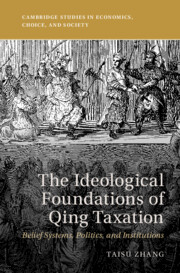Book contents
- The Ideological Foundations of Qing Taxation
- The Ideological Foundations of Qing Taxation
- Copyright page
- Dedication
- Contents
- Statistical Tables
- Preface
- Acknowledgments
- Introduction
- 1 A Short History of Qing Taxation
- 2 The Uses and Limitations of Rationalist Explanations
- 3 Pre-Qing Fiscal Regimes
- 4 The Early Qing Paradigm Shift
- 5 Mid-Qing Entrenchment
- 6 Late Qing Reforms
- 7 Theoretical Implications
- Conclusion
- Abbreviations of Sources
- References
- Index
5 - Mid-Qing Entrenchment
Published online by Cambridge University Press: 02 February 2023
- The Ideological Foundations of Qing Taxation
- The Ideological Foundations of Qing Taxation
- Copyright page
- Dedication
- Contents
- Statistical Tables
- Preface
- Acknowledgments
- Introduction
- 1 A Short History of Qing Taxation
- 2 The Uses and Limitations of Rationalist Explanations
- 3 Pre-Qing Fiscal Regimes
- 4 The Early Qing Paradigm Shift
- 5 Mid-Qing Entrenchment
- 6 Late Qing Reforms
- 7 Theoretical Implications
- Conclusion
- Abbreviations of Sources
- References
- Index
Summary
Chapter 5 discusses the entrenchment of fiscal conservatism in mid-Qing politics, covering the Yongzheng to Daoguang eras (1722-1850). A spirited attempt by the Yongzheng Emperor to expand formal agricultural tax quotas and rationalize fiscal institutions had some success, but quickly encountered widespread opposition. By the late 1730s, the Qing Court settled into a set of fiscal institutions that would remain largely unchanged for the next 170 years. Formal agricultural tax quotas were, with the exception of the grain tribute, fixed in absolute values of silver, and could no longer be increased.Furthermore, provincial and local land surveying was made illegal by imperial decree, depriving political elites of their primary, and perhaps only, source of reliable macroeconomic information. Soon after - and arguably as a direct result - a “Malthusian” worldview began to gain popularity among political elites, arguing that, because the population was rapidly growing while total agricultural output remained unchanged, the amount of taxable surplus that the state could safely extract before rural incomes fell below subsistence level was actually shrinking. Driven by this deepening sense of insecurity, the Qing Court came to view nearly any proposal to raise agricultural taxes with deep suspicion.By the late eighteenth century, such proposals met with almost automatic rejection, and often carried serious political consequences for their sponsors. Meanwhile, nonagricultural taxes continued their slow upward trend, and became the focal point for fiscal reform efforts in the early nineteenth century.
Keywords
- Type
- Chapter
- Information
- The Ideological Foundations of Qing TaxationBelief Systems, Politics, and Institutions, pp. 211 - 266Publisher: Cambridge University PressPrint publication year: 2023

